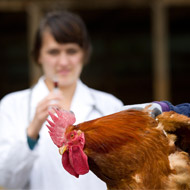Grant to reduce number of chickens used in research

The grant will fund the development of laboratory techniques for studying poultry viral diseases, without the need to infect live birds.
A Pirbright scientist has secured a grant to reduce the number of chickens used in research.
Dr Andrew Broadbent received more than £300,000 from the National Centre for the Replacement Refinement and Reduction of Animals in Research (NC3Rs).
The grant will fund the development of laboratory techniques for studying poultry viral diseases, without the need to infect live birds.
“We need improved methods for controlling these viruses and in order to realise that goal we need better tools to study them,” said Dr Broadbent, an Institute Fellow at the Pirbright Institute.
“Traditionally, research in this field has used a lot of infected birds; we hope that we can replace their use with our primary B cell model to improve our understanding of virus-cell interactions and test the ability of vaccines to produce an immune response.
“Not only would this help improve current control methods, it would reduce the number of birds required for research.”
Dr Broadbent’s research will focus on three important poultry infections: infectious bursal disease virus, avian leukosis virus, and reticuloendotheliosis virus.
Up to now, studying how these viruses interact with the cells they infect has been difficult to achieve in the laboratory. This is because the B cells die when they they are removed from the chickens, meaning that researchers have no choice but to use live infected birds in their studies.
Researchers at Pirbright, however, have found a way to extend the life of chicken B cells in the lab.
NC3Rs grant aims to test whether these cells can be used as a model to study virus infection and produce reliable results comparable to experiments conducted in live chickens.
Scientists also hope to learn whether the cells can replace chickens needed to produce virus stocks, and determine if they can be used to screen vaccine candidates. A team at Imperial College London will then build on this work by analysing how the cells respond genetically to infection using RNA sequencing.
The Pirbright Institute says the research could have a ‘worldwide impact' on the study of avian immunosuppressive viruses.
‘If scientists researching these viruses around the world were to adopt the new laboratory methods, it is estimated that over 5,000 fewer chickens would be required for experimental studies each year,’ it said in a press release. ‘Furthermore, if these viruses are better controlled as a result of this work, the overall welfare of birds would be improved.’



 The Federation of Independent Veterinary Practices (FIVP) has announced a third season of its podcast, Practice Matters.
The Federation of Independent Veterinary Practices (FIVP) has announced a third season of its podcast, Practice Matters.